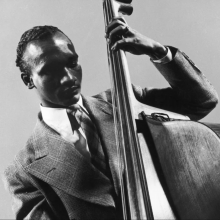
Sid Gribetz presents a five hour radio program featuring the career of Oscar Pettiford this Sunday December 4, 2022 from 2-7 PM on WKCR.
Oscar Pettiford was one of the leading innovative jazz bass players who came of age during the bebop era. He unleashed a sense of dynamic swing that set the standard influencing bass styles to this very day, and his lyrical, free flowing solos on bass, and later in his career on pizzicato cello, have lasting beauty that transcends the conventions of these instruments.
Pettiford was also significant as a composer of songs still prevalent in the modern jazz repertory - Bohemia After Dark, Swingin’ Till The Girls Come Home, The Pendulum At Falcon’s Lair, The Gentle Art of Love, Blues In The Closet, and Tricotism, to name a few. Pettiford was also a band leader and arranger conversant with the most advanced sophisticated styles, and also some third stream touches, in the 1950's.
Oscar Pettiford has a fascinating biography. He was born September 30, 1922 on a reservation in Oklahoma. His mother was Native American, and his father Harry “Doc” Pettiford was African-American also with some Cherokee roots in his family. The family moved to Minneapolis when Oscar was very young. His father was a veterinarian but also musically inclined. Doc Pettiford formed a family band with Oscar and several siblings, all skilled on multiple instruments, and successfully barnstormed and toured the midwest and south for many years.
By the time Oscar was a teenager, he settled on the bass as his instrument of choice. Still underage, he left the family and formed his own band which performed in Minneapolis nightclubs and after hours joints. Pettiford developed a reputation that was fortified with notice from major musicians who passed through town, such as Milt Hinton, Charlie Christian and Howard McGhee.
Eventually, by 1940 or 41, music business was slow in Minnesota and Pettiford was disheartened. He retired from music and began working in an armaments factory. However, McGhee looked him up and introduced him to the popular swing band leader Charlie Barnet, who was in need of another bassist and hired him. After several months with Barnet, Pettiford made it to New York and immediately established himself at the highest level. Pettiford joined Thelonious Monk in the house band at the legendary Minton’s Playhouse. Next Roy Eldridge hired him to work on 52nd Street, where he also drew the attention of Coleman Hawkins, who used him on several famous recording sessions that included extended bass solos of astonishing power.
Our story is still only in 1944. At the incredibly young age of 21 and 22, Pettiford was leading his own group at the Onyx Club where he and Dizzy Gillespie then teamed up to jointly lead a band which most jazz historians consider to be the first regularly working bebop band.
Oscar and Diz split due to a personality conflict, but not before Pettiford appeared on some of the very first legendary bebop recordings. Among his continuing experience, another milepost was a long stint in the late 1940's with Duke Ellington’s orchestra.
Pettiford’s next break came in 1949, when he fractured his arm in an injury in a softball game. During his lengthy rehabilitation, Oscar found it difficult to manipulate the heavy double bass, so he picked up the cello and utilized it as a jazz instrument. While he later returned to the bass, Pettiford regularly used the cello for swinging pizzicato solos during performances. Pettiford’s musicality shone prominently in the cello’s higher timbre. His use of the cello was unique at the time and still influential years later.
In the 1950's Pettiford was a major figure in jazz. He worked prolifically and appeared on what are now major recordings in our canon with the likes of Miles Davis, Thelonious Monk, Charles Mingus, Sonny Rollins, and many others. In the late 1950's he became house bassist at the Café Bohemia. Additionally, he led small groups and his own big band with colleagues such as Lucky Thompson, Gigi Gryce and Dick Katz, playing original compositions and innovative, sophisticated arrangements.
In 1958, Pettiford moved to Europe and eventually settled in Copenhagen where he became a leading figure performing with other expatriate Americans and also leading European musicians.
One night in 1960, he fell ill during a show and was taken to a Danish hospital. He developed paralysis type symptoms in his spine and fell into a coma and died a few days later, on September 8, 1960, at the age of 37. Doctors at the time labeled the cause of death a “polio-like virus“, but more probably it was the lingering effects from injuries suffered in a major car accident several months earlier.
Our program will celebrate his career but even in the lengthy five hour time frame of our show, we will only be able to play selected highlights.
